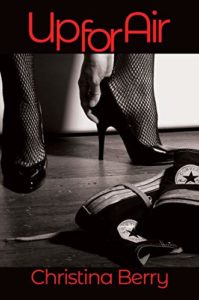An Interview with Christina Berry
 One of my new favorite people in the world right now is debut author Christina Berry. Because she lives in Texas (see what I mean about knowing a ton of authors from Texas?), we haven’t met in-person (yet). But when she posted on social media about reading and reviewing her book, I responded with interest. And let me tell you, I’m so glad I did! Not only did Christina’s writing draw me in—unique premise, fast pace, engaging characters—her personality did too. She’s fun, snarky, passionate, as well as generous, kind, and compassionate. She also has a diverse set of interests, only one of which is blogging about the rehab associated with her East Austin home, Pleasant Valley Ranch. As a fellow debut author, I’m especially delighted to feature her today in this interview. Her first book, Up for Air (“a riveting and racy read”), is available now.
One of my new favorite people in the world right now is debut author Christina Berry. Because she lives in Texas (see what I mean about knowing a ton of authors from Texas?), we haven’t met in-person (yet). But when she posted on social media about reading and reviewing her book, I responded with interest. And let me tell you, I’m so glad I did! Not only did Christina’s writing draw me in—unique premise, fast pace, engaging characters—her personality did too. She’s fun, snarky, passionate, as well as generous, kind, and compassionate. She also has a diverse set of interests, only one of which is blogging about the rehab associated with her East Austin home, Pleasant Valley Ranch. As a fellow debut author, I’m especially delighted to feature her today in this interview. Her first book, Up for Air (“a riveting and racy read”), is available now.
(Because we don’t want to confuse any readers—and a conversation between two Christinas could look a little odd—I chose to use initials for this post.)
CMC: Your writing in Up for Air is both thoughtful and thought-provoking, but the premise might push some readers outside their comfort zones. What do you hope readers learn from this story in particular?
CRB: I’m a romance reader and writer who loves a happily-ever-after ending. I’m also a sex-positive radical feminist. As such, I don’t consider any form of enthusiastically-consensual sexual intimacy between adults to be something that is shameful.
I don’t expect that everyone will whole-heartedly agree with me about that, but my hope is that by writing a likable female character who explores a boundary-pushing sexual lifestyle, it might shift the perception about sexually-active women away from the “virgin/whore” dichotomy to something more nuanced.
I love to hear that Up for Air elicits complex emotional reactions. One reviewer described Ari’s life choices as “disgusting,” but she liked the character enough to stick with her, and ultimately liked the book. That’s very exciting to me.
CMC: Up for Air released last week, and the second in the Lost in Austin series, The Road Home, is expected to be published later in 2021. What was your path to publication like? Did you always intend to write a series?
CRB: When I started Up for Air, I’d never written a book before. I had no idea what I was doing. I just wrote a bunch of words, then threw most of them out with subsequent edits. When I started, I had no intention of this being anything more than a stand-alone. Then I met the character Jake Sixkiller. I liked writing him so much that I didn’t stop until he had his own book.
When I submitted Up for Air for publication, I made no mention of the second book. I just wanted to get the first one out there. Once it was accepted and on the publishing conveyor belt, then I sent book two to the publisher for review and he accepted that one, too.
Now, I’m writing the third book. It’s Greg’s phoenix story, and it’s set in Austin and New Orleans post-Katrina. It’s some of the most difficult writing I’ve had the pleasure of struggling with. I’m hoping for a 2022 release, but first I have to finish it. *sigh*
CMC: You graduated with a BA in history from the University of Texas. How does history inform your work? Would you ever consider writing historical fiction? What is your favorite era to read about?
CRB: Weirdly, I don’t read historical fiction. Nor do I write it. It’s certainly a possibility, but I really like setting stories in the current era.
My studies focused on nineteenth century American history, particular with respect to the Cherokee Indians (Trail of Tears, Civil War, Dawes Act, etc.). In the Lost in Austin series, Jake Sixkiller is Eastern Band Cherokee. In his book, The Road Home, there are quite a few cultural references that elude to Cherokee history, but that’s about it as far as historical fiction out of me.
CMC: People watching is something you enjoy. Do you use it as inspiration for your writing? What is the most memorable event that you’ve witnessed?
CRB: Absolutely! People watching is very inspiring. I love to imagine stories about the people I see, and some of those imaginary people have walked into my manuscripts.
I don’t know if I have a most memorable people-watching experience, other than the time I watched a neighbor fall out of a tree (and that was mostly just terrifying as we called 911 for him). But I do have a lot of fun memories of wandering Sixth Street and Red River Street (the central location for much of Up for Air). I used to love to chat with Leslie Cochran. He was a local legend, known for his cross-dressing style and political activism. He was always saying or doing something worth paying attention to, and I allude to him in the book as an homage.
CMC: In addition to writing novels, you write the content for All Things Cherokee, a “resource for Cherokee genealogy and cultural information.” What are three things you wish everyone knew about the Cherokee people?
CRB: This is quite a question, and I’ve been giving it a lot of thought. I think, first off, the number one thing to know is that the Cherokee people (and Indigenous people in general) are contemporary people. So often I hear American Indians referred to in the past tense, as if we’re extinct now. We’re not. Perhaps that’s why I like writing and reading contemporary fiction. So much Native American Romance is historical, and, while there is absolutely nothing wrong with that, I really want to read more contemporary Indigenous stories, particularly “own voice.” It’s another reason why I really enjoyed writing Jake. He’s a contemporary American Indian rock star, and writing a happily-ever-after for him felt exceptionally fulfilling.
Second thing, the Cherokee are probably one of the better-known tribes (we’re the name of a Jeep, after all), but what people may not know is that there are actually three federally-recognized Cherokee tribes: Cherokee Nation, Eastern Band of Cherokee Indians, and United Keetoowah Band. Prior to the Trail of Tears (the forced migration west) we were one nation, but that Diaspora permanently divided the Nation into different entities with our own government structures, and agreements with the United States. I could easily write a whole essay on this subject, but I’ll leave it at that: we are three tribes.
And finally, let it be known that the Cherokee have always been excellent storytellers. And, as soon as we had a written language, we became great writers too. For centuries, the Cherokee passed down our stories with the telling of them. Then, in 1821, Sequoyah introduced the written Cherokee Syllabary he’d invented to the tribe. Within only a few years, most Cherokee were fully literate. In 1828, the Cherokee Phoenix, the first Native American newspaper, began printing in both Cherokee and English. The Phoenix is still running today, and Cherokees are still great writers and storytellers. Daniel H Wilson (author of Robopocalypse), Brandon Hobson (whose latest The Removed comes out in February), and Kim Shuck (the poet laureate of San Francisco), just to name a few, are all great writers and they’re all Cherokee Nation citizens.
CMC: I have to ask: How did you come up with your cats’ names? And knowing your fondness for The X Files, would you ever consider naming a pet Mulder?
CRB: Well, my cats are robots, you see. My husband is deathly allergic to cats, and I miss the sound of purring. So, one day I looked online to see if robot cats existed, and sure enough they do. They are primarily meant as risk-free companions for elderly dementia patients. Long story short, I bought two. They’re called Ada and Alan, after Ada Lovelace and Alan Turing (two influential computer scientists).
I love the idea of naming a pet Mulder! When the robotics companies improve the technology, and I decide it’s time to upgrade and buy a new generation of robot cats, I think I’ll name them Mulder and Scully.
CMC: What does literary success mean to you?
CRB: Oh goodness, I don’t know how to answer this. I think it’s a moving target, actually. Two years ago, my goal was to be published. Now, I think I want to be published A LOT. I went from wanting to be an “author” to wanting to be a “prolific author.” At some point, I think I’ll want to aim for being an “award-winning prolific author.” There will always be a new goal, a new benchmark for success. But at the most basic level, I think success will be finding an audience who enjoys reading what you write. At the end of the day, that’s what I want to do. Write stories that people enjoy and connect with.

Thanks to Christina for agreeing to this interview! If you know of an author who’d like to be featured in an interview (or you are an author who would like to be featured), feel free to leave a comment or email me via my contact page.

What a great interview!
Great interviews are easy when they feature great people! I’m sure you’re so proud, and you should be.